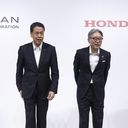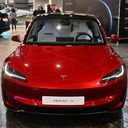Honda and Nissan merger calls for tough decisions on American jobs and vehicles
Honda and Nissan face a litany of difficult decisions about their competing vehicles and overlapping U.S. manufacturing jobs if they move forward with a merger.
Why it matters: A combination of Honda and Nissan — formerly fierce competitors — would create the world's third-largest automaker by vehicle sales behind Toyota and Volkswagen.
- It would also raise concerns about plant consolidation for two companies that have invested heavily in U.S. manufacturing.
Driving the news: The Japanese automakers confirmed Monday that they are aiming for a merger via a joint holding company.
- They plan to sign an agreement by June 2025 and get shareholder approval by April 2026.
- The tie-up could also bring along Mitsubishi, a longtime partner of Nissan's.
Between the lines: Honda is the bigger and healthier of the two and would appoint a majority of the holding company's board, the automakers said.
- The proposal comes as Nissan is urgently cutting costs, having fallen behind in the global EV race, while both companies are struggling in the bruising Chinese automotive market.
- The companies said in a statement they expect to standardize their vehicle platforms, "optimize" their manufacturing footprints, "create stronger products, reduce costs, enhance development efficiencies, and improve investment efficiencies."
The intrigue: In a press conference in Japan, Honda's CEO was forced to fend off suggestions his company "was being railroaded into a deal by Japanese officials concerned about the survival of Nissan," the Wall Street Journal wrote.
- "This is not a rescue," Honda CEO Toshihiro Mibe said, though the WSJ said he "struggled when asked what attracted him to Nissan as a partner."
Reality check: A deal, no matter the terms, poses vexing questions.
- Which vehicles will survive? Their vehicle lineups are not complimentary — indeed, there's significant overlap. In the U.S., for example, the Honda Accord competes with the Nissan Altima in the sedan segment, while the Honda CR-V competes with the Nissan Rogue in the crossover category.
- Will they cut jobs in the U.S.? Honda has more than 23,000 workers at 12 factories in the U.S., while Nissan has some 15,000 workers at three plants here. The companies said they "anticipate ... optimizing their manufacturing plants." Honda's factories are heavily concentrated in Ohio, Indiana, North Carolina, South Carolina and Alabama, while Nissan's are located in Tennessee and Mississippi.
- How will a merger help them compete in China? Chinese automakers are exerting extraordinary pressure on their competitors in the EV space. A combined Honda-Nissan would have greater scale to compete in China, but Mibe reportedly said at the press conference there wouldn't be any significant merger benefits until 2030.
- Can they avoid culture clash? Honda is known for its high quality standards and commands higher prices than Nissan, which has shown more willingness to discount vehicles in the past.
The bottom line: Making this a good fit will require some heavy lifting.
















